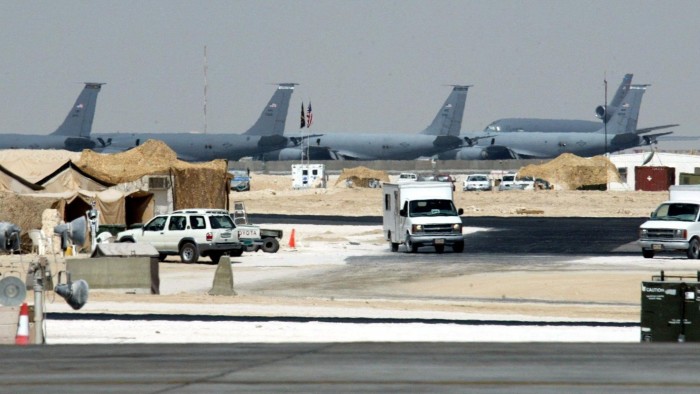Unlock the White House Watch newsletter for free
Your guide to what Trump’s second term means for Washington, business and the world
Oil prices tumbled on Monday afternoon in a sharp turnaround as traders interpreted Iranian missile strikes against a US air base in Qatar as a sign that it is likely to avoid attacking energy infrastructure in the region.
Brent crude, the international benchmark, dropped almost 6 per cent to $71.11 a barrel in the aftermath of the attacks, which targeted the Al Udeid air base near Doha, where 10,000 US troops are stationed. Qatar said it had successfully repelled the attacks.
Crude had traded as high as $81.40 a barrel earlier on Monday amid concerns that Iran would target oil infrastructure or attempt to close the Strait of Hormuz in retaliation for a US attack on Iranian nuclear facilities at the weekend.
West Texas International, the US benchmark, fell by a similar amount to below $70, largely giving back gains made since Israel launched its surprise attack against Iran’s nuclear facilities and air defences 10 days ago.
“Iran’s decision to retaliate via a well telegraphed missile attack on US bases implies that they are less likely to weaponise oil,” said Michael Alfaro, chief investment officer at Gallo Partners, a hedge fund focused on energy and industrials.
He said prices should remain generally elevated given the increased tensions, but fundamentals continue to suggest the oil market was well supplied.
Rory Johnston, an oil market researcher at Commodity Context, said a sell-off in crude “looks a lot like the market is interpreting this latest move as inherently de-escalatory”.
He said the move by Iran on Monday looked similar to a situation during Donald Trump’s first term as president in 2020, when Tehran retaliated against the US’s killing of its top military official by firing missiles at Iraqi bases hosting US troops. In that case, Tehran telegraphed the attack to Trump through back channels in advance.
Despite suggestions from some Iranian hardliners that Tehran should respond to the US strikes by blocking traffic through the Strait of Hormuz, the channel for about a quarter of the world’s seaborne oil trade, crude supply from the Middle East is still unaffected by the escalating conflict.
But the elevated prices have nonetheless prompted jitters in Washington. Trump on Monday urged American oil companies to pump more oil, warning that allowing prices to rise would benefit Iran.
“EVERYONE, KEEP OIL PRICES DOWN. I’M WATCHING! YOU’RE PLAYING RIGHT INTO THE HANDS OF THE ENEMY. DON’T DO IT!” he wrote on his Truth Social Platform.
He later wrote: “To The Department of Energy: DRILL, BABY, DRILL!!! And I mean NOW!!!”
While a small proportion of US oil is produced on federal lands, the vast majority is privately operated, meaning the government has little control over output volumes.
“The hard truth is that any president has only limited options to affect the price of crude oil,” said Bob McNally, president of Rapidan Energy and an energy adviser to former president George W Bush.
“The best policy to avoid a further price hike is to, as [secretary of state Marco] Rubio has, dissuade Iran from pulling the oil trigger: from attacking or disrupting Gulf energy production flows. That is the best option to avoid a further price hike.”
Trump’s predecessor Joe Biden tapped the US Strategic Petroleum Reserve — a vast emergency stockpile of crude — to help bring down prices after Russia’s full-scale invasion of Ukraine in 2022, but the effects took time to trickle through.



